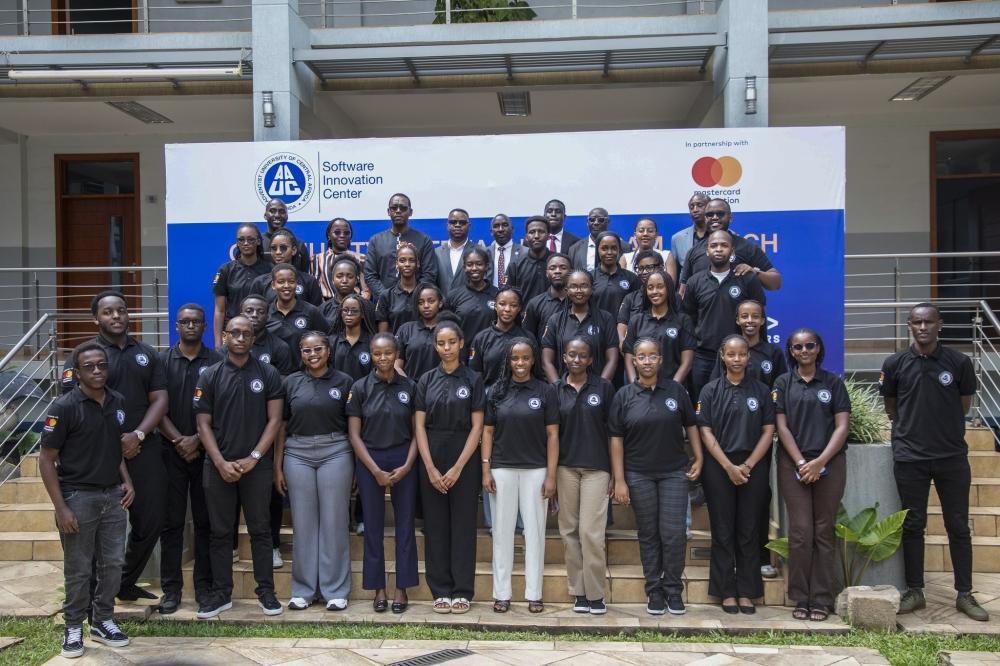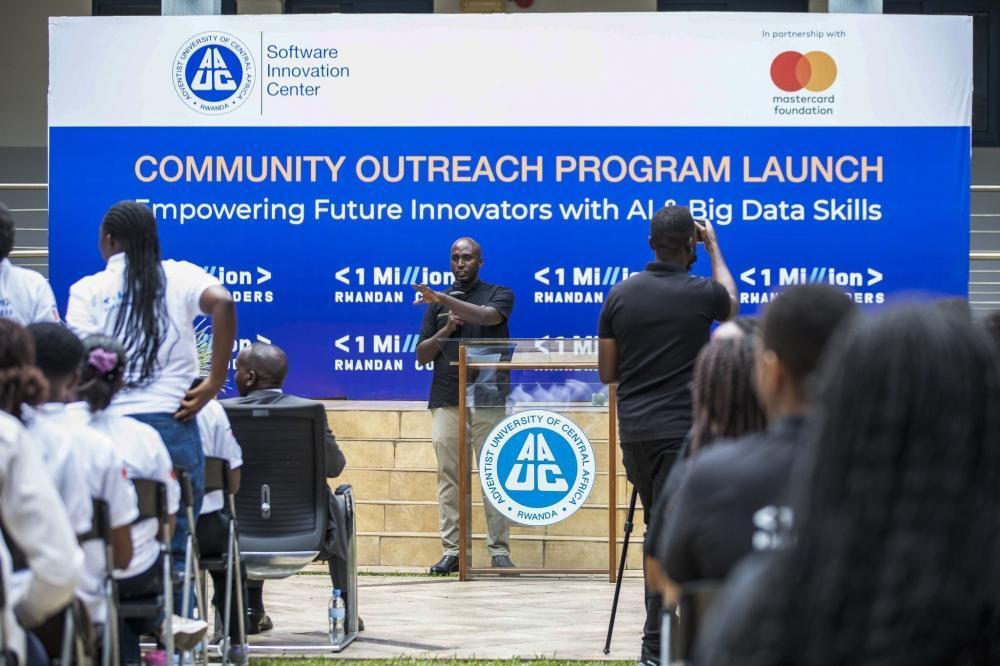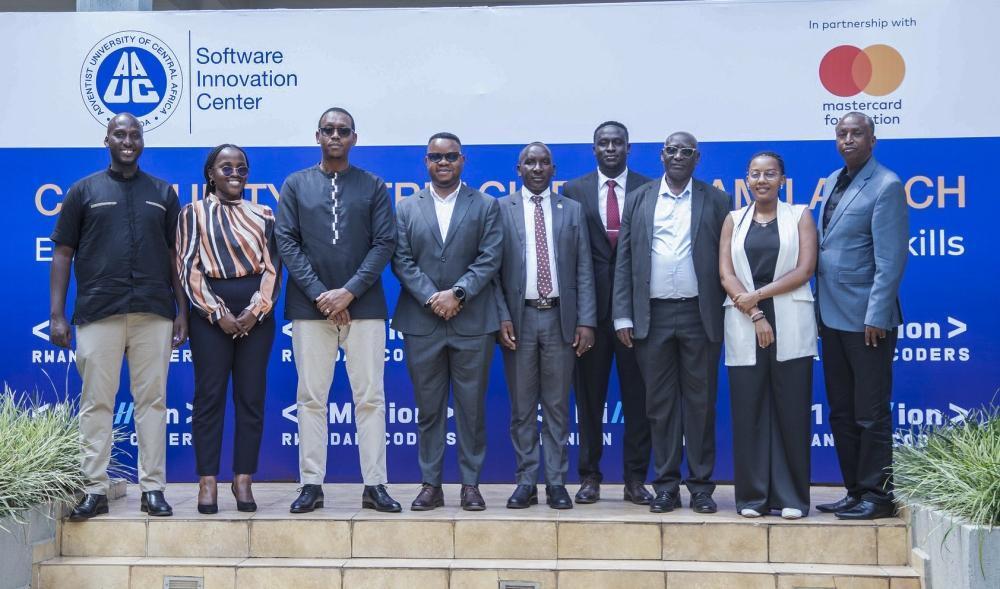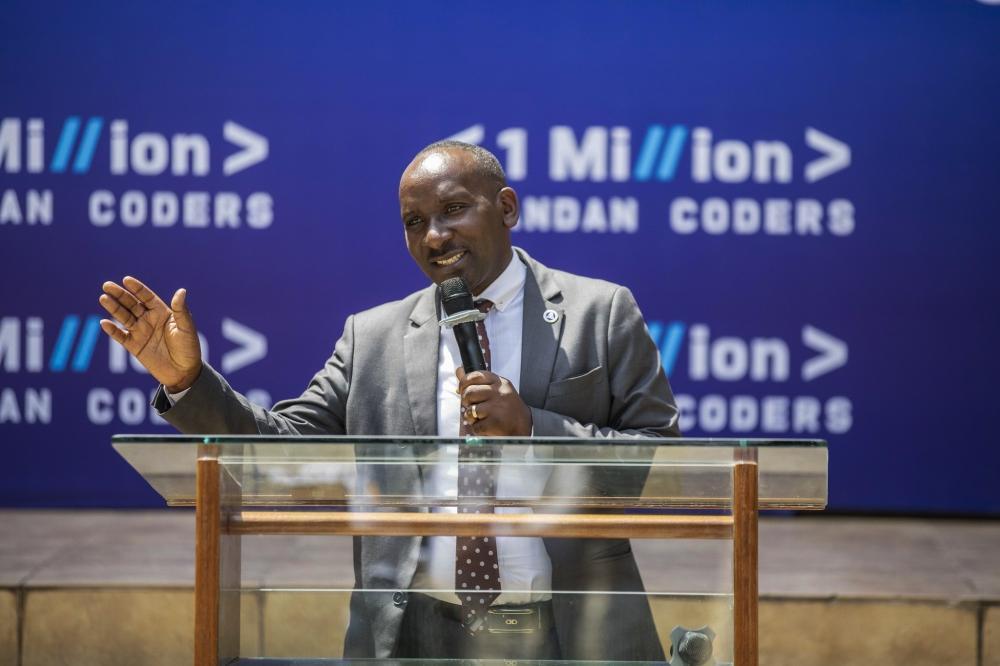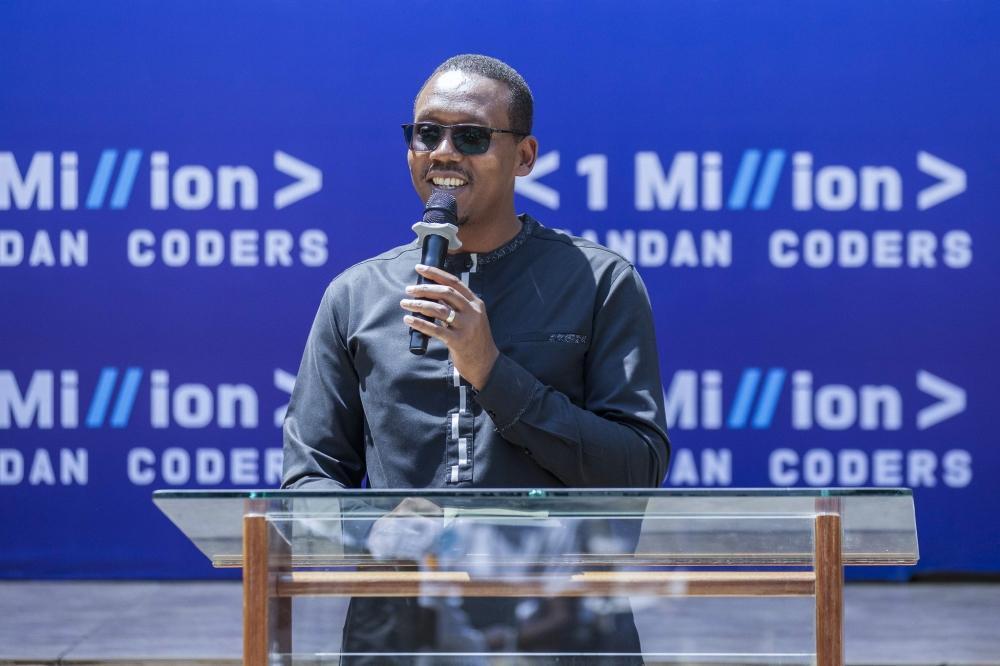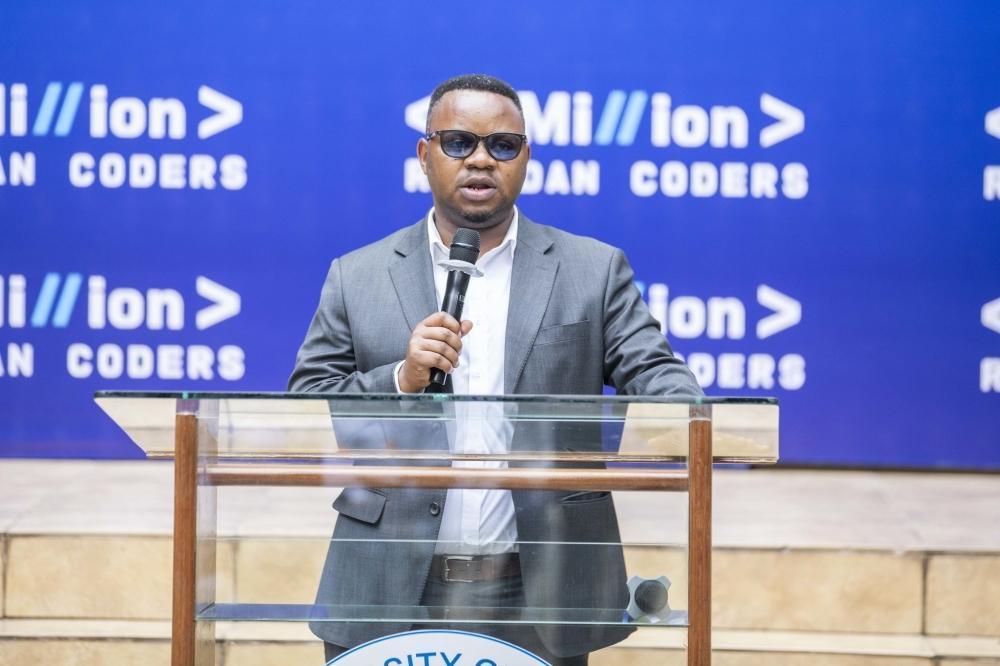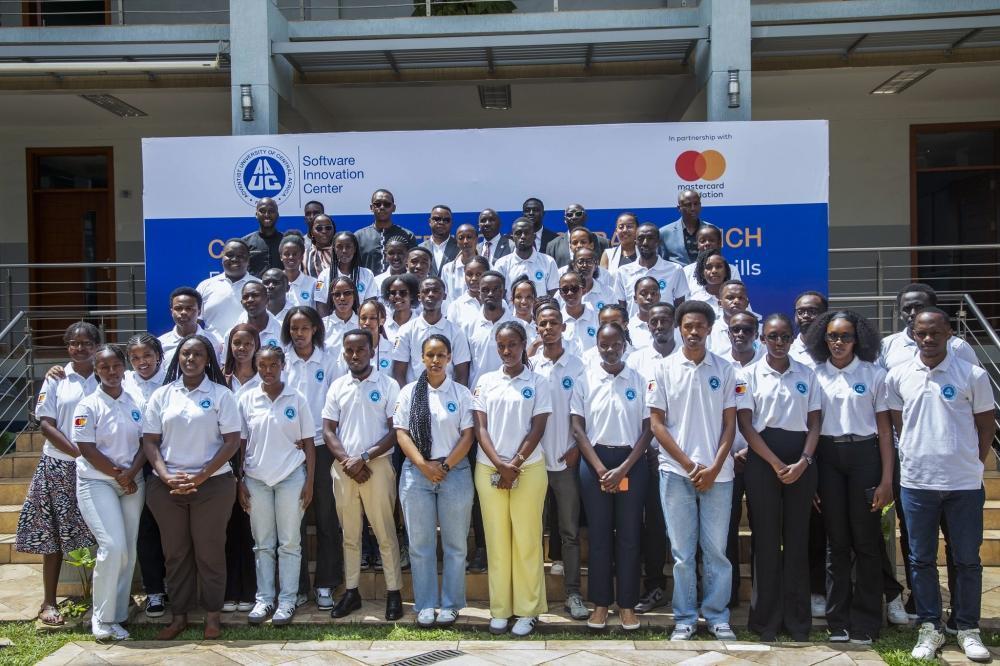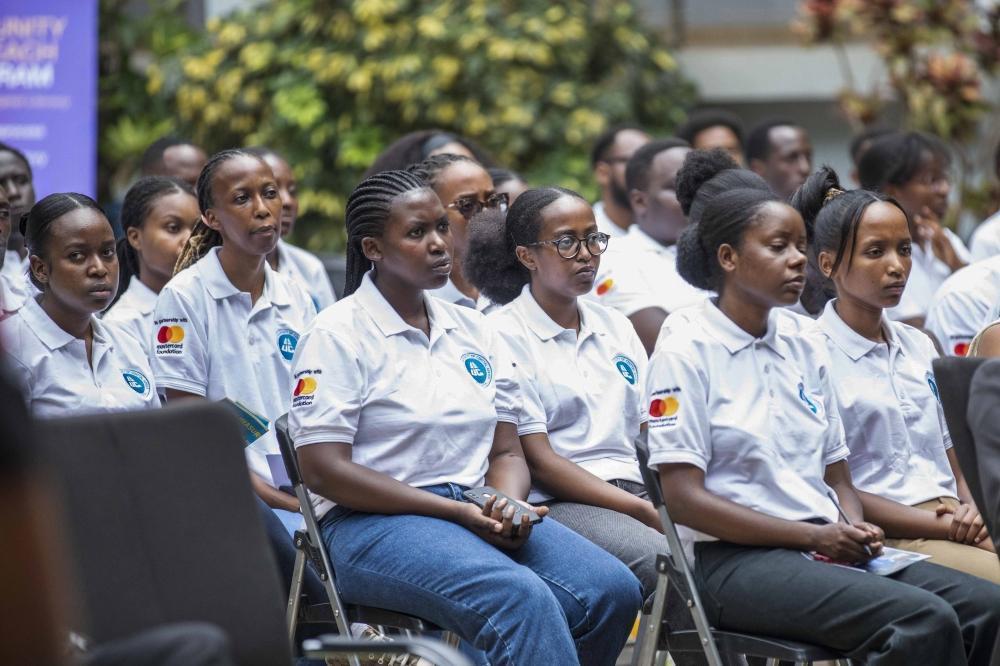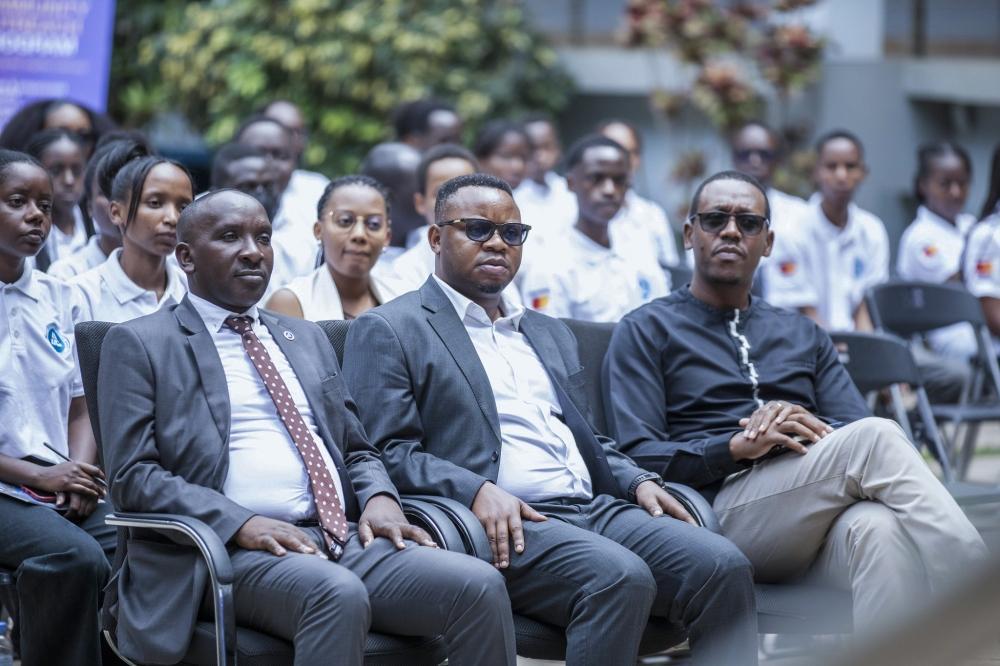Africa-Press – Rwanda. The Adventist University of Central Africa (AUCA), Gishushu campus on Tuesday, May 27, launched the Innovation Centre Community Outreach Program to equip young Rwandans with artificial intelligence (AI) and big data skills.
The programme aligns with Rwanda’s goal to train one million coders as part of the Second National Strategy for Transformation (NST2), a five-year government plan running from 2024 to 2029.
Student innovators from AUCA will lead the programme, using knowledge and skills gained through the Innovation Centre to share their expertise with 10 secondary schools across the country.
Prince Ishimwe Mukotsi, the Coordinator of the Innovation Centre and Head of AUCA’s Software Engineering Department speaks at the launch on May 27.
Prince Ishimwe Mukotsi, Coordinator of the Innovation Centre and Head of AUCA’s Software Engineering Department, explained the vision behind the programme. “Initially, the focus was on training IT students to become skilled engineers employed by various companies. However, no company could claim to have developed these innovators themselves. The innovation centre was established to change this by nurturing entrepreneurs from Africa, not just coders working for others,” he said.
Mukotsi added that the innovation centre project, funded by the Mastercard Foundation, among other partners, focused on 50 top-performing students, 70 per cent of whom are female.
“Two cohorts have completed their training and are now preparing to give back to the community. This year, our outreach targets 10 secondary schools across Rwanda,” he said.
The schools chosen, including Glory Secondary School, FAWE Girls School Gisozi, Maranyundo Girls School, and Gashora Girls Academy in Bugesera District, among others in Northern, Western, and Eastern provinces, were selected for their existing computer infrastructure. The outreach programme is designed to fit within the school calendar and will teach students data cleaning, exploratory data analysis, and building models with various algorithms, Mukotsi added.
He noted that the innovators are divided into five clusters focusing on health, agriculture, financial technology, and crime prevention, each developing applications aligned with their sector.
“The outreach programme aligns with AUCA’s broader mission of producing quality graduates and equipping them with entrepreneurial mindsets. Some of our first cohorts are already employed or on professional internships. The community outreach will further broaden their impact,” Mukotsi explained.
Officials in a group photo at the launch
During the launch, the Coordinator of AUCA-Gishushu Campus is Dr Pacifique Nizeyimana shared a vision for exponential growth through the programme, stress that the aim is to reach one million records by leveraging a geometric sequence, impacting people who will, in turn, impact others.
He noted that the goal is not just to retain talent within the university but to send skilled graduates into the community to contribute actively to Rwanda’s development.
“Many complain about unemployment but this programme provides a solution for graduates to become job creators, not just job seekers,” Munyamasoko stated.
Grace Ishimwe Mwiza, a member of the first Innovation Centre cohort, shared her personal journey and how the programme transformed her perspective. “When I joined, I was just a regular student with ideas but unsure how to turn them into reality. The Innovation Centre taught me how to develop user interfaces, applications, and think like an innovator,” she said.
“Our projects, such as community-based family planning support and child mortality solutions, showed us that technology serves people, especially those in rural areas who are often left behind,” Mwiza explained.
Mwiza highlighted how the innovation centre gave her a platform to share her story and inspire both professionals and young people, adding that the community outreach programme extends the centre’s mission beyond the university to show that innovation is for everyone.
“Quality education alone is not enough. While producing graduates is standard, the real impact comes from using our IT skills to help the community because today, technology is life,” said AUCA’s Deputy Vice-Chancellor for Academics, Théogène Niyonzima.
AUCA’s Deputy Vice-Chancellor for Academics, Théogène Niyonzima addresses particiapnst at the launch
Niyonzima stressed the need to reach those in rural areas and marginalised communities who lack access to innovation opportunities.
“Our country is well-connected with fibre optic networks, and 90 per cent of Rwandans have phones. Our innovators must teach others how to use technology to improve lives,” he urged.
He acknowledged the role of partnerships in realising the programme. “This is not just about AUCA. It’s about academia, industry, and development partners working together. We had an idea but lacked means until the Mastercard Foundation and Bank of Kigali stepped in,” Niyonzima noted.
To support this digital drive, AUCA invested over Rwf130 million this year in internet infrastructure to ensure campuses and surrounding communities have reliable access.
“The issue is not infrastructure but delivering high-quality programmes and sustaining them through training and knowledge transfer,” Niyonzima added.
Elisee Kamanzi, Acting Country Director of the Mastercard Foundation, said that the NGO ought to ensure that everyone can learn and prosper, noting that the initiative is proof of concept to scale innovation among young Rwandans.
Elisee Kamanzi, Acting Country Director of the Mastercard Foundation speaks to the students.
Kamanzi praised AUCA for ensuring gender inclusion, with 70 per cent of participants being young women. He described the innovation focus areas, such as health, agriculture, education, and fintech as critical to Rwanda’s economic growth.
He urged young innovators to see themselves not just as learners but as future employers.
“Innovation is not exclusive. It must be accessible to all Rwandans who want better lives. We want to create job opportunities and improve livelihoods through technology,” Kamanzi stated.
Yves Iradukunda, Permanent Secretary at the Ministry of ICT and Innovation, said that the launch of the programme shows the commitment of young learners and partners to expand the programme’s reach beyond the initial 100 beneficiaries,” he said.
Yves Iradukunda, Permanent Secretary at the Ministry of ICT and Innovation, delivers his remarks at the launch
Iradukunda noted that Rwanda’s One Million Coders initiative aims not only to prepare youth for employment but also to empower them as job creators. He commended AUCA for challenging the stereotype that coders only seek jobs and encouraged ongoing innovation and entrepreneurship.
Highlighting expansion plans, Iradukunda revealed intentions to use smart classrooms during school holidays to pilot the programme in 10 schools initially.
“Depending on the results, we could extend the programme to 100 schools or all secondary schools with infrastructure and connectivity,” he said, urging implementers to document lessons for future scaling.
He noted increased interest from global companies, particularly from Germany and Europe, seeking to invest in Rwanda’s growing Global Business Services sector. “Our young people’s talent, motivation, and language skills position Rwanda as a potential global tech hub.”
Students pose for a group photo at the launch
Sudents during the launch of the Innovation Centre Community Outreach Program on Tuesday, May 27. Photos by Emmanuel Dushimimana
For More News And Analysis About Rwanda Follow Africa-Press

